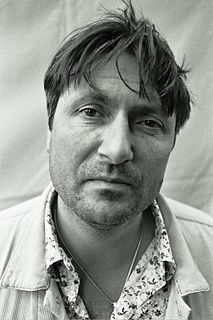A Quote by Sandra Cisneros
I like to mix it up, because the kind of comments you can get from a fiction writer about your poetry are going to be very different than what you'll get from a poet.
Related Quotes
When I have a writing workshop, I like to have people that are anthropologists and people who are poking around in other fields, I like to have them all in the same workshop, and not worry about genre. I like to mix it up, because the kind of comments you can get from a fiction writer about your poetry are going to be very different than what you'll get from a poet. Or the comments you'll get from a filmmaker about your performance are going to be very different. My writing workshop is about mixing it up, cross-pollinating, not only in genres but in occupations.
A couple of pieces of advice for the kids who are serious about writing are: first of all, to read everything you can get your hands on so you can become familiar with different forms of writing: fiction, non-fiction, poetry, journalism. That's very important. And also keep a journal. Not so much, because it's good writing practice. Although it is, but more because it's a wonderful source of story starters.
I don’t think ‘science fiction’ is a very good name for it, but it’s the name that we’ve got. It is different from other kinds of writing, I suppose, so it deserves a name of its own. But where I can get prickly and combative is, if I’m just called a sci-fi writer. I’m not. I’m a novelist and poet. Don’t shove me into your damn pigeonhole, where I don’t fit, because I’m all over. My tentacles are coming out of the pigeonhole in all directions.
If there's an article about sexual assault, if there's a video about feminism on YouTube, you're going to get the most horrible, disgusting comments ever. And sometimes the comments are pornographic, and sometimes the comments are really harassing. So I think that it's kind of a difficult place for women to write sometimes.
I say "on principle" [regarding 'lesbian writer'] because whenever you get one of your minority labels applied, like "Irish Writer," "Canadian Writer," "Woman Writer," "Lesbian Writer" - any of those categories - you always slightly wince because you're afraid that people will think that means you're only going to write about Canada or Ireland, you know.
It’s never going to be very mainstream. One reason is that poetry requires concentration, both on the part of the writer and the reader. But it’s kind of unkillable, poetry. It’s our most ancient artform and I think it’s more relevant today than ever, because it’s one person saying what they really believe.
The way that TV is set up is very helpful for when a show comes to an end because as an actor, you've got acting, but as a showrunner you still get to edit for three months and after that ends you get to do a sound mix. So, as a writer-performer in television, it's a very nurturing, gradual environment to say goodbye to a show.
The poet or the revolutionary is there to articulate the necessity, but until the people themselves apprehend it, nothing can happen ... Perhaps it can't be done without the poet, but it certainly can't be done without the people. The poet and the people get on generally very badly, and yet they need each other. The poet knows it sooner than the people do. The people usually know it after the poet is dead; but that's all right. The point is to get your work done, and your work is to change the world.
I'm primarily a poet, so I'd have to say in my case I'd investigate the mystery in poetry in a different way than prose might investigate it, in a way that includes the power of the music of language and maybe more imaginatively in poetry, but I don't really know about better or worse. I guess it depends on the writer.
I tend to like the way poets form communities. Writing can be lonely after all. Modern life can be lonely. Poets do seem to be more social than fiction writers. This could be because of poetry's roots in the oral tradition - poetry is read aloud and even performed. I'm just speculating, of course. At any rate, because poets form these groups, they learn from one another. That is one of the best things about being a poet.
What I wrote all the time when I was a kid - I don't want to call it 'poetry,' because it wasn't poetry. I was not that kind of a writer. I was a rhymer. I was a fan of Dorothy Parker's, so maybe I wrote poetry to that extent, but my main focus was the humor of it, and word construction, and the slant. Your words, it's a very powerful experience.

































